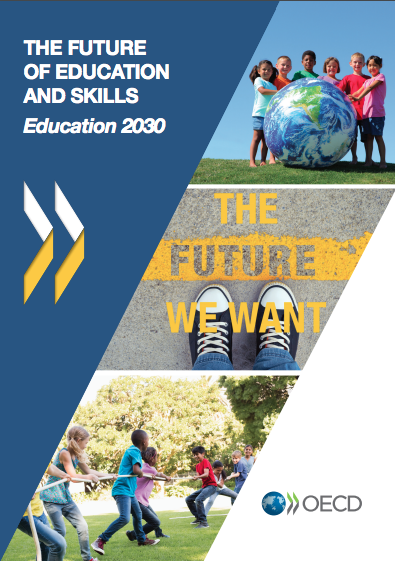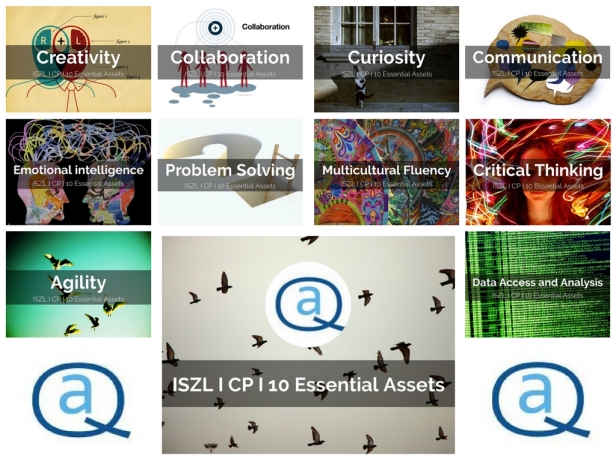Design principles for instructional systems in the future
The OECD recently published a position paper emerging from the Future of Education and Skills 2030 project. In it they have outlined their vision and underpinning principles for the future of education systems. To design future ready education.
It made good reading as it was closely aligned with the philosophy of an International Baccalaureate (IB) education. The innovative framework of the IB Career-related Programme (CP), a response by the IB to the challenges of accelerating globalisation and faster technological development, is revealed as wholly in tune with this vision. Through these programmes we can be confident that students at ISZL are well-prepared for the unprecedented challenges of the modern world they will graduate into.

The Education 2030 project sets out the knowledge, skills, attitudes and values students will need to thrive and shape their world and then asks How can instructional systems develop these knowledge, skills, attitudes and values effectively?
On knowledge:
Future-ready students will need both broad and specialised knowledge. Disciplinary knowledge will continue to be important, as the raw material from which new knowledge is developed. (OECD, 2018). The IB Diploma ensures this through a broad and balanced curriculum. The IB Career-related Programme combines a more specialised, deeper, career-related knowledge with other diploma subjects.
Skills
There has been much written on the skills requirement for a rapidly changing world and the OECD add their insight – the outcome of exchange of ideas in the project and cutting edge research. The skills identified are curiosity, self-regulation, multicultural fluency, collaboration, practical problem-solving, critical thinking, creative thinking, social and emotional skills (notably empathy).
The Career-related Programme has Personal and Professional Skills (PPS) at its core. In consultation with business and a synthesis of research into the skills challenge, ISZL has developed 10 Essential Assets shown below. The OECD project confirms these as a relevant skill-set to focus on.

The paper suggests that these skills or ‘procedural knowledge’ typically develops through practical problem-solving, such as through design thinking and systems thinking. The IB are currently developing systems thinking to be embedded in their programmes, with help from ISZL staff. At the same time ISZL have made some exciting connections to collaborate with the ETH University in Zurich to develop design thinking to promote human-centred innovation. This framework combines empathy, creativity, critical thinking, problem solving and collaboration to innovate and create new products, services and systems. It is a sound framework to guide instructional systems that can develop the skills students will need.
Creating new value
These innovation skills combine to underpin one of the project’s ‘transformative competencies’ – creating new value. There is recognition that new sources of growth are urgently needed to achieve stronger and sustainable development in the future. Innovation can offer the solutions to economic, social challenges, whilst innovative economies are more productive, more adaptable and better able to support higher living standards.
One of the design principles of the career-related programme at ISZL is to create real products for real people. The report affirms our decision to put innovation skills at the core of the programme in the PPS course and also to design the BTEC Diploma in Business around creating new products and services. Meanwhile, other ISZL courses are developing Innovation in Science, Communication and Global Innovation.
Authenticity and interrelation
Two of the design principles the report outlines are authenticity and interrelation. Authenticity means learners should be able to link their learning experiences to the real world and have a sense of purpose in their learning. Having a human-centred innovation approach will make this connection and give students the sense of purpose in their learning. This can be enhanced through a service learning approach. This is at the core of both the IB Diploma and the Career-related Programme, and a requirement of any ISZL education. Students will see the meaning in their learning through investigating how they can meet the needs of others.
The second principle is interrelation. Learners should be given opportunities to discover how a topic or concept can link and connect to other topics or concepts within and across disciplines, and with real life outside of school. Identifying other peoples’ needs and finding solutions to meet them will connect students learning with the outside world, but the connections across subjects are harder to make in the current instructional system. Achieving a design principle of a multi-disciplinary approach to solving problems will prove harder. Future ready education must have both disciplinary knowledge together with the capacity to think across the boundaries of disciplines and ‘connect the dots’.
Perspective and Sustainability
There are two further themes in the report I would like to reflect on: perspective taking and the sustainability. The first recognises that in a world of interdependency and conflict, people will successfully secure their own well-being and that of their families and their communities only by developing the capacity to understand the needs and desires of others. This respect for others, expressed as an element of international mindedness, is at the heart of an IB education and multi-cultural fluency is one of the ISZL 10 essential assets at the core of the IBCP. The world’s problems will be solved across networks and boundaries. Increasingly, innovation springs through co-operation and collaboration with others to draw on existing knowledge to create new knowledge. More than this, human life is enriched by the diversity of values and attitudes arising from different cultural perspectives
Finally sustainability. The challenges posed by the dynamic, disruptive world can only be met through care about the planet. Innovation must have sustainability at its heart. This would be the final design principle of future ready education. Whilst sustainability is written into many of the IB Diploma courses, there is more to do to make it instrumental in the design of educational systems.
The Education 2030 project offers us a vision to measure our developments in instructional programmes against. I am confident in our innovative curriculum. It measures up well.
Reference
Organisation for Economic Cooperation and Development (2018). The future of Education and Skills: Education 2030. [online] Paris. Available at: http://www.oecd.org/education/2030/E2030%20Position%20Paper%20(05.04.2018).pdf
